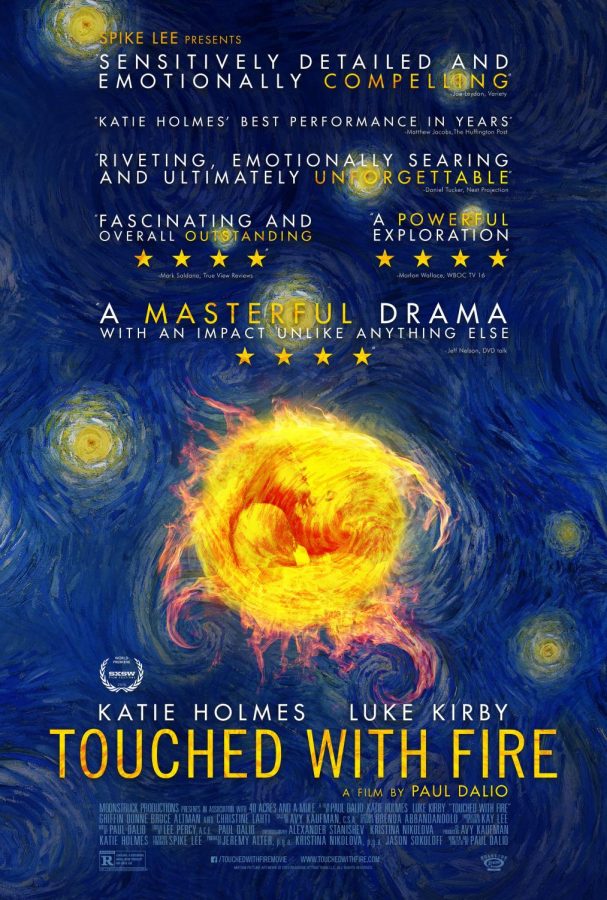‘Touched with Fire’ remains lukewarm
“Touched With Fire” is director Paul Dalio’s first feature-length film.
February 22, 2016
“Touched with Fire,” written and directed by Paul Dalio, is named after psychologist Kay Redfield Jamison’s book that examines the connection between bipolar disorder and artistic creativity. In the same vein, the film follows Marco (Luke Kirby) and Carla (Katie Holmes), two bipolar poets who meet while hospitalized and fall in love.
Marco calls himself “Luna,” and he’s quick to christen Carla “Sol.” This astrological symbolism is prevalent throughout the film, which is divided episodically with each segment bearing the name of a season. This quirky structure is fun and effective in complementing the natural harmony which Marco and Carlo see in their relationship.
Like many creatives, the couple has imaginations that are too fertile to consider their meeting a mere coincidence. They see themselves as two interstellar bodies whose intersecting revolutions can only be divinely ordained—a beautiful conceit that anyone who has ever been in love can understand.
While the audience sees the partnership as a joyous union, Marco and Carla’s doctors and family members repeatedly declare their relationship to be damaging, volatile and unhealthy. It’s refreshing that “Touched with Fire” is so willing to examine its characters’ suffering, not as a result of their illness itself, but as a reaction to a society that does not value their unique constitutions.
Throughout the film, I kept wondering what it was about Marco and Carla that convinced the others they were unwell.
While there were several moments of trembling, paranoid anxiety and at least one collapse into crippling depression for the two, it seemed as if these situations were precipitated by the rejection and stigma the two faced for their heightened sensitivity—an entirely undervalued trait.
The director makes certain the audience feels the same frustration as Marco and Carla do that others cannot see how beautiful their world is. The problem with this treatment is that the complexity of bipolar disorder is oversimplified and even glossed over. Aside from a shocking revelation that comes late in the second act, the deeply tragic reality of the condition is hardly examined.
Instead of a multifaceted examination of a romance that is beautiful yet doomed to failure, the audience is given a series of clichéd proclamations about the affinity between genius and madness. In one instance, the sugary-sweet rhetoric is complemented by montages of Marco and Carla walking through the forest together and writing poetry. This hackneyed treatment reduces the film’s impact. Quitting one’s day job and hanging out in the forest hardly qualifies as credentials to be the next Lord Byron. This could also be seen as a commentary on the discrepancy between Marco and Carla’s grandiose fantasy and the reality of their situation.
“Touched with Fire” explores a divide in perceptions. However, while the film was an entertaining, offbeat romance, it left me desiring more from the two leads. The intensity and complexity of their relationship offered a very interesting intellectual prospect to me, yet it was pushed aside in favor of a paint-by-numbers romance.








